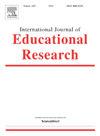Heat affects learning: Evidence from Spanish autonomous regions
IF 2.5
3区 教育学
Q1 EDUCATION & EDUCATIONAL RESEARCH
引用次数: 0
Abstract
This study examines the influence of temperature on Programme for International Student Assessment (PISA) scores in Spanish autonomous regions, using data from PISA and ERA-5 climate reanalysis. An econometric model is employed to explore the quasi-random variation in temperature, while accounting for differences across regions and years through fixed effects. The study reveals a non-linear relationship between temperature and PISA scores, particularly in Mathematics and Science. A notable negative effect of high temperatures (above 26.7°C) on the scores is identified. Specifically, each additional day with temperatures exceeding 26.7°C is associated with a decrease in Mathematics scores by 0.0016 and in Science scores by 0.0022. Conversely, Reading scores demonstrate no significant sensitivity to such extremes in temperature. Additionally, the study explores the cumulative impact of temperature over multiple years, revealing enduring effects on educational outcomes. For instance, over a three-year period, Mathematics scores show a cumulative negative impact of -0.0154 and Science of -0.0077. These findings emphasize temperature's notable influence on educational outcomes, highlighting the need for policy interventions against climate change's educational impact. The study enhances understanding of the complex interactions between temperature and education, offering valuable insights for educators and policymakers in addressing climate-related challenges in education.
高温影响学习:来自西班牙自治区的证据
本研究考察了温度对西班牙自治区国际学生评估项目(PISA)分数的影响,使用了来自PISA和ERA-5气候再分析的数据。采用计量经济模型探讨温度的准随机变化,同时通过固定效应考虑区域和年份的差异。这项研究揭示了温度和PISA分数之间的非线性关系,尤其是在数学和科学方面。高温(26.7°C以上)对得分有显著的负面影响。具体来说,气温每增加一天超过26.7°C,数学成绩就会下降0.0016,科学成绩就会下降0.0022。相反,阅读分数对这种极端温度没有明显的敏感性。此外,该研究还探讨了多年来气温的累积影响,揭示了对教育成果的持久影响。例如,在三年的时间里,数学成绩的累积负影响为-0.0154,科学成绩的累积负影响为-0.0077。这些发现强调了温度对教育成果的显著影响,强调了针对气候变化的教育影响进行政策干预的必要性。该研究加强了对温度与教育之间复杂相互作用的理解,为教育工作者和政策制定者应对教育中与气候相关的挑战提供了有价值的见解。
本文章由计算机程序翻译,如有差异,请以英文原文为准。
求助全文
约1分钟内获得全文
求助全文
来源期刊

International Journal of Educational Research
EDUCATION & EDUCATIONAL RESEARCH-
CiteScore
6.20
自引率
3.10%
发文量
141
审稿时长
21 days
期刊介绍:
The International Journal of Educational Research publishes regular papers and special issues on specific topics of interest to international audiences of educational researchers. Examples of recent Special Issues published in the journal illustrate the breadth of topics that have be included in the journal: Students Perspectives on Learning Environments, Social, Motivational and Emotional Aspects of Learning Disabilities, Epistemological Beliefs and Domain, Analyzing Mathematics Classroom Cultures and Practices, and Music Education: A site for collaborative creativity.
 求助内容:
求助内容: 应助结果提醒方式:
应助结果提醒方式:


